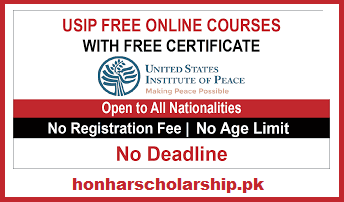The United States Institute of Peace (USIP) offers a range of free online courses designed to provide education and training in areas such as peacebuilding, conflict resolution, and international relations. These courses cater to a diverse audience, including students, professionals, and anyone interested in promoting peace and resolving conflicts around the world. This article will explore the USIP’s free online courses, their benefits, and how they can help individuals grow personally and professionally. USIP Free Online Courses In USA.
| University: | The United States Institute of Peace Academy |
| No. of Courses: | Unlimited |
| Courses Fee: | Free of Cost |
| Eligible nationality: | All Nationalities |
| Access Mode: | Online |
| Last Date: | No deadline |
What is USIP?
The United States Institute of Peace (USIP) is a non-profit organization established by the U.S. government in 1984. Its primary mission is to prevent and resolve violent conflicts, promote peace, and help develop strategies for international diplomacy. USIP works globally, offering resources and support for individuals, organizations, and governments engaged in conflict management, peacebuilding, and related fields.
In addition to its research and policy work, USIP also offers educational programs, including free online courses, to equip people with the skills and knowledge needed to work in peacebuilding and conflict resolution.
Also Check:
- Donghua University CSC Scholarships In China
- United Nations FAO Internship In Italy
- Humber College Entrance Scholarship In Canada
Benefits of USIP Free Online Courses In USA
1. **Access to Quality Education**: One of the main benefits of USIP’s online courses is that they provide access to high-quality education for free. Participants get the chance to learn from experts in the fields of peacebuilding and conflict resolution, gaining knowledge that they can apply in real-world situations.
2. **Flexibility**: These courses are entirely online, allowing learners to study at their own pace and from any location. This makes it easy for individuals with busy schedules or those living in remote areas to take part in these programs.
3. **Global Impact**: By completing these courses, individuals can contribute to global peace efforts. The knowledge gained can be applied to resolving conflicts, promoting social justice, and fostering understanding among different groups.
4. **Career Development**: For professionals looking to advance in the fields of diplomacy, international relations, or conflict management, USIP’s courses can enhance their skills and qualifications. Many individuals who complete these courses find that they are better prepared for roles in organizations dedicated to peacebuilding, humanitarian work, or international development.
5. **Certification**: Although the courses are free, USIP offers a certificate of completion at the end of each course. This certificate can be a valuable addition to a resume, demonstrating a commitment to professional development and a deep understanding of peace-related issues.
Types of Courses Offered by USIP
USIP’s free online courses cover a wide range of topics related to conflict resolution, peacebuilding, and international diplomacy. Some of the key areas of study include:
1. **Introduction to Conflict Management and Negotiation**
This course introduces learners to the basics of conflict management and negotiation techniques. It covers topics such as how conflicts arise, the different types of conflicts, and the strategies that can be used to address and resolve them. The course provides valuable insights into how negotiators can work toward peaceful solutions in difficult situations.
2. **Building Peace in Divided Societies**
In this course, learners explore the challenges of promoting peace in societies that are deeply divided by ethnic, religious, or political conflicts. It examines the role of peacebuilders in fostering reconciliation, reducing tensions, and building social cohesion. Students will learn about the methods used in post-conflict reconstruction and peacebuilding efforts.
3. **Human Rights and Peacebuilding**
This course focuses on the intersection of human rights and peacebuilding. It covers the principles of human rights law and how they can be applied in situations of conflict. Learners will gain an understanding of how protecting human rights can contribute to lasting peace and stability in conflict-affected areas.
4. **The Role of International Institutions in Conflict Resolution**
In this course, participants examine the role of international organizations, such as the United Nations, in conflict resolution. It looks at how these institutions facilitate peace negotiations, provide humanitarian assistance, and help rebuild societies after conflict.
5. **Understanding Violent Extremism and Terrorism**
This course delves into the causes and consequences of violent extremism and terrorism. Learners will explore strategies to prevent radicalization and the ways in which communities can counter violent extremism through education, community engagement, and policy initiatives.
6. **Youth, Peace, and Security**
Focusing on the role of young people in promoting peace, this course addresses how youth can be engaged in peacebuilding efforts. It examines the challenges young people face in conflict zones and how they can contribute to building more peaceful and resilient societies.
How to Enroll in USIP Free Online Courses
Enrolling in a USIP free online course is straightforward. Here is a step-by-step guide to help you get started:
1. **Visit the USIP Website**: Go to the official USIP website (www.usip.org) and navigate to the “Learn” or “Online Courses” section.
2. **Browse Available Courses**: USIP offers a variety of courses, so take your time to browse through the available options. Read the course descriptions to find the one that best matches your interests or professional goals.
3. **Create an Account**: To enroll in a course, you will need to create a free account on the USIP learning platform. This will allow you to track your progress and receive a certificate upon completion.
4. **Start Learning**: Once you’ve enrolled in a course, you can start learning right away. Most courses are self-paced, so you can complete them at your own convenience.
5. **Earn a Certificate**: After completing the course, you will receive a certificate of completion, which can be added to your resume or LinkedIn profile.
Who Can Benefit from USIP Free Online Courses In USA?
USIP’s online courses are open to anyone with an interest in peacebuilding and conflict resolution. Some of the groups that can benefit from these courses include:
– **Students**: Those studying international relations, political science, law, or related fields can enhance their education by taking USIP’s courses. These courses provide practical knowledge and real-world examples that complement academic learning.
– **Professionals**: Individuals already working in the fields of diplomacy, humanitarian aid, or international development can improve their skills and understanding of peacebuilding efforts.
– **NGO Workers**: Those working in non-governmental organizations (NGOs) that focus on conflict resolution or human rights can gain insights into new strategies and best practices for promoting peace.
– **Community Leaders**: People working at the community level in areas affected by conflict can learn how to manage tensions, engage in peacebuilding activities, and create safer, more inclusive environments.
Conclusion
USIP’s free online courses offer an excellent opportunity for anyone interested in peacebuilding and conflict resolution to gain valuable knowledge and skills. These courses are accessible, flexible, and designed to equip individuals with the tools needed to make a positive impact in their communities and on the global stage. Whether you’re a student, professional, or simply someone passionate about creating a more peaceful world, USIP’s courses provide a pathway to learning and growth in the field of peace and conflict management.
By taking these courses, you not only enhance your own understanding but also contribute to the larger goal of building a more peaceful and just world.



